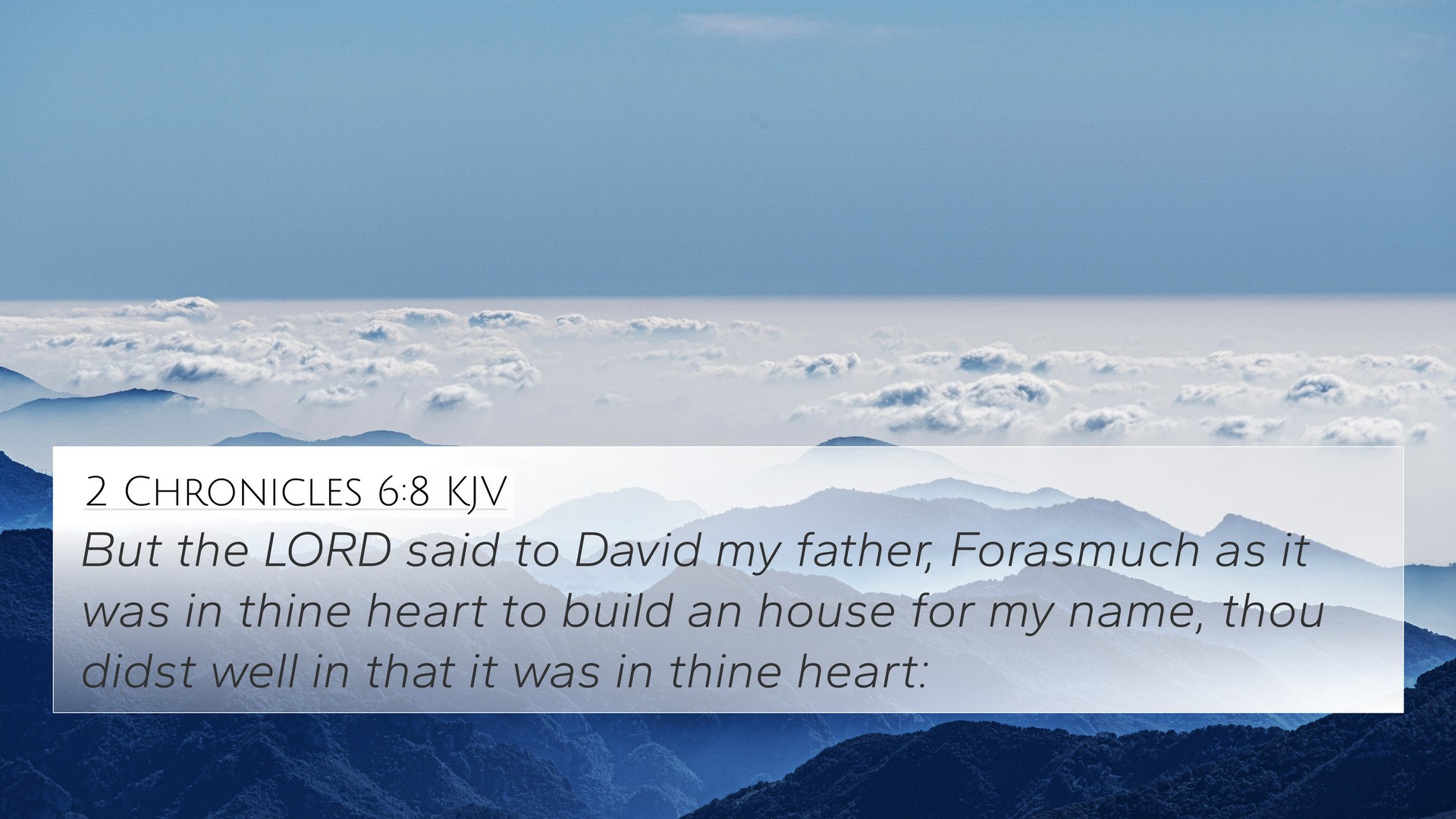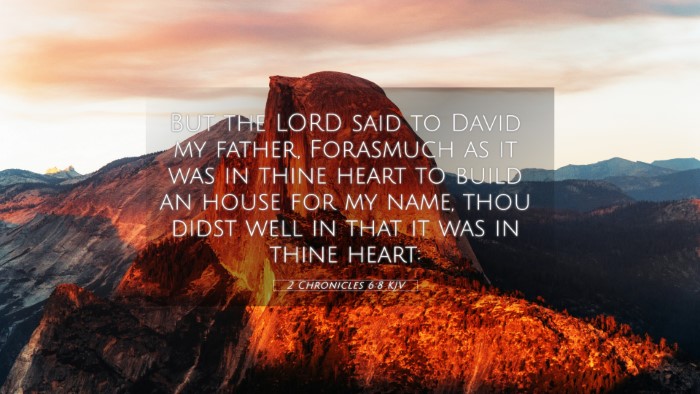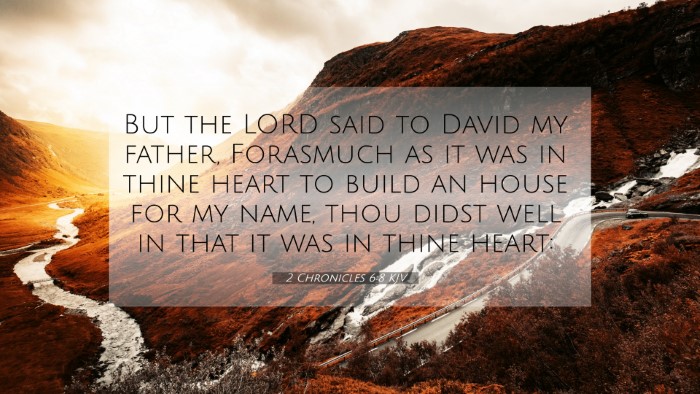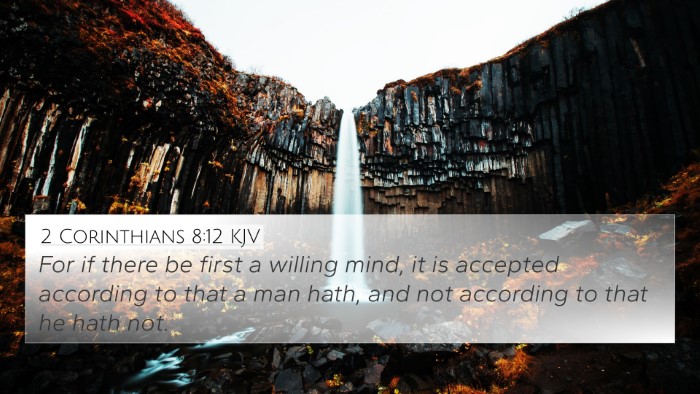Understanding 2 Chronicles 6:8
In 2 Chronicles 6:8, Solomon expresses the fulfillment of God's promise to his father David: “But the Lord said to David my father, ‘For you were a man of war and have shed blood.’” This verse reflects the importance of God's covenant and His plan for the temple's establishment. The insights from various public domain commentaries provide a deeper understanding of this significant moment in Israel's history.
Insights from Matthew Henry's Commentary
Matthew Henry emphasizes the significance of God's promise, underscoring that Solomon acknowledges the divine choice in establishing the temple. Henry notes that the temple serves as a dwelling place for God among His people, which reflects God’s desire to be near His creation. This moment also highlights the transition from a warrior king to a builder king, representing peace and divine favor.
Insights from Adam Clarke's Commentary
Adam Clarke discusses the implications of David being a man of war, explaining that his character and life experiences were not suitable for temple construction. Clarke points out that God’s selection of Solomon for this task signifies a paradigm shift in leadership and the importance of peace in worship. This verse encapsulates both a historical event and a theological principle regarding God's intentions and human involvement in divine plans.
Insights from Albert Barnes' Commentary
Albert Barnes elaborates on the significance of Solomon's role, mentioning that while David was a notable warrior, it was Solomon’s peaceful reign that permitted the construction of the temple. Barnes indicates that this change illustrates the ideal conditions under which true worship can flourish. His commentary highlights the relationship between God's plans and human actions, noting how God fulfills His promises over generations.
Cross-References Related to 2 Chronicles 6:8
- 1 Chronicles 22:8-10 - God's promise to David that Solomon would build the temple.
- 1 Kings 5:3-5 - Solomon's intention to build the temple.
- 2 Samuel 7:12-16 - God's covenant with David regarding his lineage.
- Isaiah 9:6-7 - The prophecy of the peace that will reign under David’s lineage.
- Hebrews 8:1-2 - Jesus as our High Priest who serves in a heavenly sanctuary.
- Acts 7:46-47 - Stephen recounting Solomon's temple as a dwelling place for God.
- Romans 8:28 - God's faithfulness in fulfilling His promises.
- Zechariah 6:12-13 - The significance of the temple and the role of the Messiah.
- Matthew 1:1 - The genealogy of Jesus, highlighting His connection to David.
- John 14:2 - The promise of dwelling places for believers, reinforcing the importance of temple imagery.
Theological Insights
This verse invites a greater exploration of God's faithfulness across both the Old and New Testaments. It reflects God's intricate plan to dwell with His people: from the physical temple in Jerusalem to the spiritual dwelling within believers through the Holy Spirit. The connection to Christ as the ultimate temple, as discussed in John 2:19-21, reinforces this theological theme.
Cross-Referencing and Thematic Connections
To truly understand 2 Chronicles 6:8, exploring its connections with other scriptures is essential. This verse’s context is enriched by examining passages that discuss the temple's significance and God's promises. Thematic Bible verse connections such as the transition from the old covenant to the new covenant reveal deeper insights into how God's purpose is fulfilled through different eras in biblical history.
For example, the shift from David’s warrior nature to Solomon’s peaceful reign can be compared to the transformation of believers who are called to pursue peace through Christ (Matthew 5:9). Understanding these nuances provides clarity on how scripture builds upon itself across both Testaments.
Tools for Biblical Cross-Referencing
For those interested in conducting their cross-reference studies, tools such as a Bible concordance, Bible cross-reference guides, and other comprehensive Bible reference resources can be incredibly helpful. These tools assist in identifying connections between verses, facilitating a richer comprehension of biblical texts.
By employing cross-referencing Bible study methods, believers can effectively trace themes, narratives, and theological insights throughout the Scriptures, enhancing their spiritual growth and scriptural understanding.





